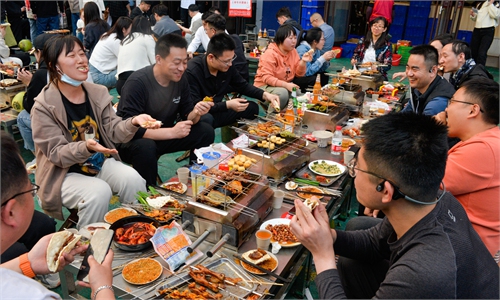Old industrial city goes viral due to BBQ business, casts light on way out for more cities in seeking transformation

Zibo barbecue Photo: screenshot from website
"Zibo barbecue" nowadays is a buzzword probably known by more and more Chinese people, as the former industrial base in East China's Shandong Province made an about-face, becoming the hottest travel destination in the country in about a month or so.
However, reports that rates for an economy hotel in Zibo skyrocketed to 1,000 yuan ($145) a night triggered wide controversy. The sudden popularity in tourism circles and consequent jaw-dropping prices led people to pause and think how the transformation of an industrial city casts light on the way out for similar industrial cities in China, and how they can achieve long-run sustainability in seeking a transformation.
"How come the price of an economy hotel in Zibo skyrocketed to 1,000 yuan one night?" netizens asked on social media. The normal price for the same hotel was only 100 to 160 yuan previously. The local government told the Hongxing News that it is investigating the case.
A news release by the local government soliciting students from Tsinghua and Peking universities to visit Zibo for free dumbfounded many. Students from the two leading universities only need to pay their transportation fees, and the local government will pay for everything else.
Before it went viral, Zibo saw daily visitors totaling about 10,000. The number rose to 18,000 each day since March and on April 1 it rocketed to 33,600, even higher than during the high season in the Spring Festival, data released by local railway authorities showed.
The local accommodation bookings in Zibo increased by 800 percent compared with 2019 for the upcoming May Day holidays, and keyword searches for "Zibo barbecue" on one platform increased by 770 percent year-on-year, media reports said.
Some tourists were told to wait for 160 tables in a queue at a Zibo barbecue restaurant and some said they had to try five different restaurants to find a place relatively less busy to serve more customers.
Zibo follows the historical trend of the country's industrial structure, transforming one city from a traditional manufacturing base to a production- and services-led development mode, and it also draws on the successful transformations of other cities, which makes its transformation road much smoother, Tian Yun, a former vice director of the Beijing Economic Operation Association, told the Global Times on Sunday.
While grasping the huge opportunity of the internet economy, the Zibo government has made efforts to achieve its current popularity, including arranging volunteer tour guides and mobilizing more manpower to maintain street security. It is these efforts that made Zibo embark on the road of standardized development and improve its reputation with tourists, Tian noted.
Amid rising prices in local hotels, the Zibo market supervision authorities on Sunday released a warning letter to business operators. It reminded local businesses to be self-disciplined and provide consumers with goods and services at reasonable prices.
"It is the responsibility of all businesses in Zibo to safeguard and cherish the reputation of the city… Local authorities will beef up their supervision of business operations," the letter read.
Tian noted that from the perspective of supply and demand, rising prices are natural when a city has higher demand among tourists, but supporting services and standards must be raised accordingly.
Xuexiang, a city in an industrial area of Northeast China's Heilongjiang Province, suffered huge setbacks because of tourism rip-offs, which resulted in a huge loss for its reputation.
The positive efforts of Zibo's local government to adjust any loopholes or improve its emerging problems are key factors as to whether the city can achieve sustainable development in the process of its transition, Tian noted.
In the long run, other than barbecues, Zibo needs to continue to explore new growth points to achieve continuous popularity in the tourism sector or to attract more young people to travel, work and live in Zibo, the expert noted.
There are other cities in the same position, especially in the post-COVID period, and such competition is fierce. It will require systematic cooperation across government departments to realize the goal, Tian further explained.


